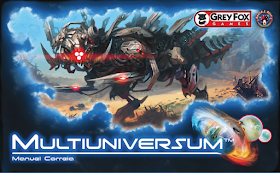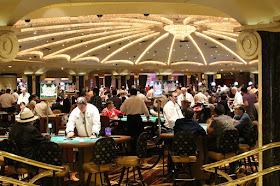▼
Links
▼
07 March 2020
The End (For Now, At Least)
The time has come for me to take a break. After this article, I will be going on an indefinite hiatus.
There are a number of reasons for this decision. Not least among those is the fact that I am not gaining any dedicated repeat readership. Despite my best efforts, the number of people who come back to read my posts every week remains a very small number. Barely in the double digits.
Additionally, there's the matter of time. My work as a middle school teacher takes up a vast quantity of time. I had been doing my best to carve what time I could in the evenings or weekends to write articles, take photos for game reviews, research market trends, etc. But I'm finding that I just don't have the time for it all. It's been a long time since I've been able to do any 'how to play' videos, which is frustrating to me, as there are a lot of games out there that need better tutorial videos. I know I'm no cinematic master, but at least (in my opinion) the videos I make are made in a more intuitive format than many of the ones I've seen out there.
29 February 2020
Board Game Review: Underwater Cities
John can be very impulsive sometimes. One day, he showed up to our usual Friday night game night with a new game that he'd seen at the FLGS and bought immediately because he thought it looked interesting.
Well, we played it that night, and again a couple weeks later. The game in question was (of course) Underwater Cities by Vladimir Suchy from Rio Grande Games. It turned out to be an interesting fusion of worker placement, economic development, and resource management. Normally, these are three game mechanics for which I don't care. But oddly enough, this game combined them in a way that made me not hate it.
But I'm getting ahead of myself. Let's do this properly, shall we? Here are the numbers:
22 February 2020
The Appeal of Board Games
Not too long ago, I published an article in which I referenced an ex-girlfriend who once told me that I think too much. Specifically, it was in the context of a comparison of casinos to board game cafes, and the differences between board games and gambling. I was reminded of this by two events that recently happened: I attended a friend's party, and a different friend sent me a link to an article about how board games can reduce cognitive decline in old age.
The article does not mention the reason why board games are so beneficial to mental fortitude; it quotes the author of a scientific study as saying 'it is not just general intellectual and social activity, it seems; it is something in this group of games that has this small but detectable association with better cognitive ageing.' Which implies that they don't claim to know why board games improve cognitive function in the elderly.
Sure, I'm no scientist, but I have a pretty good idea what it is about board games that make them so beneficial. Two factors: social interaction and mental engagement.
15 February 2020
Board Game Review: Draftosaurus
If you're looking for an adorable variant on a card-drafting mechanic, then look no further. Draftosaurus by Antoine Bauza, Corentin Lebrat, Ludovic Maublanc, and Théo Rivière, published by Ankama, is a very simple card drafting game, but instead of drafting cards, you're drafting dinosaurs!
Players take on the role of zookeepers looking to populate their parks with newly cloned dinosaurs. Each player wants to get the best combination of dinosaurs possible to make their dino-zoo more interesting to patrons than the other parks' owners.
Before we get any further, let's take a look at our numbers:
08 February 2020
Ten Candles: A Unique Roleplaying Experience
I recently watched an interesting video entitled '10 Great RPGs That Aren't Dungeons and Dragons.' That was how I learned about Ten Candles, a zero-prep one-shot roleplaying game by Stephen Dewey and published by Cavalry Games. It sounded interesting, so I read the description to the Dork Spouse, who expressed immediate interest.
After purchasing a copy of the rules, I called up a couple of friends (who were suggested by the Dork Spouse), and we all arranged to play a game together. So we sat down to tell the tale of a quartet of doomed individuals, trying to escape from an airport during the end of the world. I later ran some other games for other groups, and now I would like to share my experiences with you.
Ten Candles is somewhere between a normal RPG, like Fate or GURPS, and the one-shot mostly-free-form storytelling venture that is Fiasco. Unlike Fiasco, there is a GM, and dice rolls are still used to determine success or failure, but more in the style of Fiasco, it takes place in a single session, and the goal is less about succeeding in a mission and more about telling a great story.
An Overview of Ten Candles
The GM chooses a module (there's no reason you couldn't also create one yourself). That's the extent of preparation. Then you sit down around a table with some friends and create characters. This is done with index cards; each character gets a virtue (a single word describing some positive characteristic), a vice (a single word describing a negative feature), a moment (something that could potentially happen to bring your character hope), and a brink (some unsavory or unethical thing that your character has done in the past, and that you are likely to do again in a dark moment). Each of these is written on a different card.Then the players record a final message (in the style of 'whoever finds this message, I want you to know that we tried'). All lights are extinguished except for the ten candles in the centre of the table, and play begins.
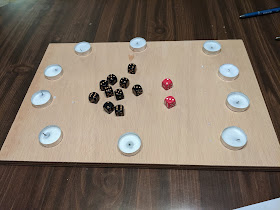 |
| The candles which give the game its name, and which serve as an important part of the game's core mechanic. |
They are nebulous and ambiguous. The GM can't even make any decisions about who or what They are before the game begins, because the players influence what They are, how They behave, and what They are able to do. They change each game, and not even the GM knows exactly what they are until the game is underway (sometimes even later).
The one thing that is always true about Them is that They avoid the light. So long as you stay in the light, you're safe.
But after five days of burning through power reserves, the world's generators are blown out. Power failures are occurring with increasing rapidity. Your characters are in a safe place for the moment, but the lights are going to go soon. Whatever the goal of the chosen module is, you have to try to accomplish it whilst there's still time.
But here's the thing: Ten Candles is a game of tragic horror. Horror, because it's frightening. Tragic, because your characters are going to die.
The game always ends with every character dying.
At the end, after telling a story of tragic heroism, of struggling against the dying of the light only to die along with that light, the players listen to the recording they made at the beginning of the game. They then sit back and enjoy the tale they have told together.
Some Detail
Players roll a number of six-sided dice to accomplish any task or attempt to be successful in any sort of conflict. If any of those dice result in a six, the task is successful. If none result in a six, then not only does the task fail, but the scene ends, a candle is extinguished, the dice pool is reduced by one, and players undergo a brief ritual in which they 'establish truths;' that is, they make a single statement about the world that must be accepted by all players (including the GM) as truth. This can be as simple as 'we found our way to the house', or as grandiose as 'the government created Them as genetically engineered monsters to serve as soldiers.' Then play continues in the next scene.
Once a candle goes out, it may not be reignited. Whether this is intentional (as the result of a failed die roll) or accidental (someone sighed heavily and blew a candle out), it brings the players one step closer to the end.
In most cases, some dice can be rerolled by burning one of the cards that contain your character's virtue, vice, moment, or brink, and when you burn your moment, you may gain a hope die which is more powerful than a regular die. But generally, it's a simple case of 'roll all the dice and hope that at least one lands on six.'
Additionally, when a roll is successful, it will often be the player, rather than the GM, who narrates the outcome of that roll. This gives the players greater control over the game than in most RPGs.
The Games We Played
In my first game, the Dork Spouse and I sat down with three of our friends to tell the tale of three people and a service dog trapped in Terminal A of an airport, after seeing Terminals B and C go dark. Then a voice over the intercom announced that there was a plane at Terminal D that would take off in three hours.
A curmudgeonly old man, a flight attendant, and a greedy head of a non-profit organisation joined forces (along with the dog, who's human had vanished before the game began), to find a runway service truck they could drive to Terminal D. There, they found some more survivors and boarded the plane just before the lights went out in the terminal right before taking off. Afterwards, an argument amongst the passengers escalated until a fire broke out in the plane's cabin. The last surviving PC died in the ensuing crash.
All the players enjoyed the game. They said it was an interesting experience to play a game they knew from the beginning they weren't going to 'win.' And knowing that the characters were going to die allowed them to really explore their personalities.
The second game was about a group of former sorority sisters getting together at Christmas in an isolated rented mansion in upstate New York and trying to survive when cut off from civilisation. The third game was about people who had just moved to a new city to make a fresh start in life and were staying in a hostel as they try to find a permanent home when the lights went out. In that game, they had learned that there was an arena across town that was being set up as a refuge, and the local schools were operating as waystations, and all they had to do was find a way to make it there.
The second game was about a group of former sorority sisters getting together at Christmas in an isolated rented mansion in upstate New York and trying to survive when cut off from civilisation. The third game was about people who had just moved to a new city to make a fresh start in life and were staying in a hostel as they try to find a permanent home when the lights went out. In that game, they had learned that there was an arena across town that was being set up as a refuge, and the local schools were operating as waystations, and all they had to do was find a way to make it there.
The Point of Ten Candles
Obviously, that's a double-meaning expression. On one hand, the point of Ten Candles is to tell a great story. But the larger question: 'what's the point in playing a game in which you know before you even begin that your character is going to die? You can't win, so why bother playing at all?'
You may as well have asked why members of Star Fleet take the Kobayashi Maru test. It's not about winning. It's about what you learn from the experience.
From the rulebook:
It is a game about loss, but it is also a game about hope. Through it all, you must remember this: Though your characters will die, you must have hope that they will survive. That hope will live on, even in the end. But hope can be lost when those who guard it are pushed to the edge. It is in those moments that the darkness around becomes the darkness within, and that is when They have truly won.
And that, I think, is the real 'point' of Ten Candles. By telling stories in darkness, we strengthen the light. By playing games of fear, we reinforce our own strength. Or, to put it another way (and in the words of G.K. Chesterton), 'Fairy tales do not tell children the dragons exist. Children already know that dragons exist. Fairy tales tell children the dragons can be killed.'
Ten Candles is not about telling stories in which there is no hope. It is about telling stories in which, in the end, hope is all that's left.
So that's my impression of Ten Candles. I recommend you give it a try! Until next week, remember as always to
Ten Candles is not about telling stories in which there is no hope. It is about telling stories in which, in the end, hope is all that's left.
So that's my impression of Ten Candles. I recommend you give it a try! Until next week, remember as always to
Game on!
01 February 2020
Board Game Review: Multiuniversum
John found a game that he really enjoyed when we went to Geekway to the West last year. It's called Multiuniversum, and it was designed by Manuel Correia. It was originally published by Board & Dice, with a second edition published by Last Level, and the current edition is from Grey Fox.
The premise is that scientists working on creating portals to alternate universes have succeeded in creating those portals, but now must shut them down before horrors from those other universes emerge into ours. You score points by closing portals, as well as gaining bonus points, set-collection style, by gathering data from the universes as you shut down the portals.
Let's take a look at this little game, shall we?
25 January 2020
Spoilers, Rage, and Toxic Fandom
Several months ago, The Dark Crystal: Age of Resistance was released on Netflix. Obviously, I binged it the very next day. And loved it. As I'm sure you can tell from the review I wrote of it.
I'm sure it will come as no surprise to you that I had been a member of the 'Age of Resistance Fan Group' on Facebook leading up to the release. I found it a convenient place to keep up with news, see stills and trailers in advance of the series, and geek out with fellow aficionados.
What was very disappointing to me, however, was how volatile and antagonistic that group became after the show was released.
Some people were unable or unwilling to binge the entire season in one sitting. These people asked for others to put spoiler warnings on posts that contained spoilers. And much to my surprise, there was a large and very vocal contingent of fans that absolutely and vociferously refused.
18 January 2020
Board Game Review: Blokus
In the midst of the revolution in which a number of amazing companies produce some amazing new games and many small companies produce many more amazing games, it's easy to scoff at the large 'mainstream' companies who continue making games which are intended to appeal to the general public instead of the board game community. But that doesn't mean that some of their games aren't really good.
This is the case with Blokus (pronounced BLOCK-us), created by Bernard Tavitian and published by Mattel. Though it bills itself as a family game, it holds a surprising level of depth and strategy. It is a refreshingly thinky game that is easy to learn and play, but contains intense tactical challenges.
But let's not get ahead of ourselves! We'll start as we always do, with the numbers:
11 January 2020
Casinos: Gambling vs Board Games
An ex-girlfriend of mine once told me that I think too much. At the time, I remember thinking this was a strange complaint; thinking, after all, is how we solve problems. It's what separates us from animals; it has enabled all the progress (and, granted, a lot of the problems) that we experience today. Without thinking, we wouldn't have modern vaccines, computers, space flight, air conditioning, or any of the other modern conveniences that have made life livable.
Bear with me. This will be pertinent in a moment.
I recently went to a couple of nostalgia-based concerts. By which I mean, a couple of bands from the 70s and 80s were performing live, and the Dork Spouse or I wanted to see them, so we bought tickets and enjoyed listening to some music from our childhood.
Both concerts were performed in casinos. Aside from a short time at a family function hosted at a casino many years ago, I had never before been in a casino in my adult life. As I walked through the casinos to get to the events hall where the concerts were held, I found myself contemplating the nature of gambling and the people who play these sorts of games.
04 January 2020
Board Game Review: On Tour
Sometimes you find a game that surprises you with its depth. What appears to be a simple fluffy game with no appeal turns out to contain some hefty decisions and require intense thought. On Tour, by Chad DeShon and published by Board Game Tables Dot Com, was one of those games. When I first saw it, I was unimpressed with the theme, and didn't think much of it. But when I actually sat down to play it, I was shocked at how much fun it is.
Sure, it's not going to be a serious game for a heavy Friday night game session with the hardcore gamers. But as a party game, or a light filler, it is unexpectedly satisfying! I might not have ordered a copy for myself, but I received a voucher for a discount, and felt it was worth having at that price.
So let's take a look at this game, starting with the numbers:
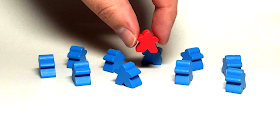
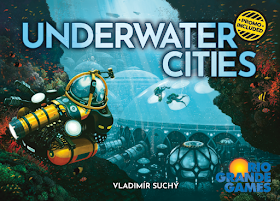
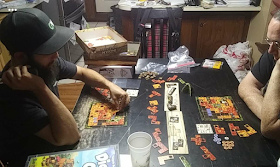
/pic4447676.jpg)
